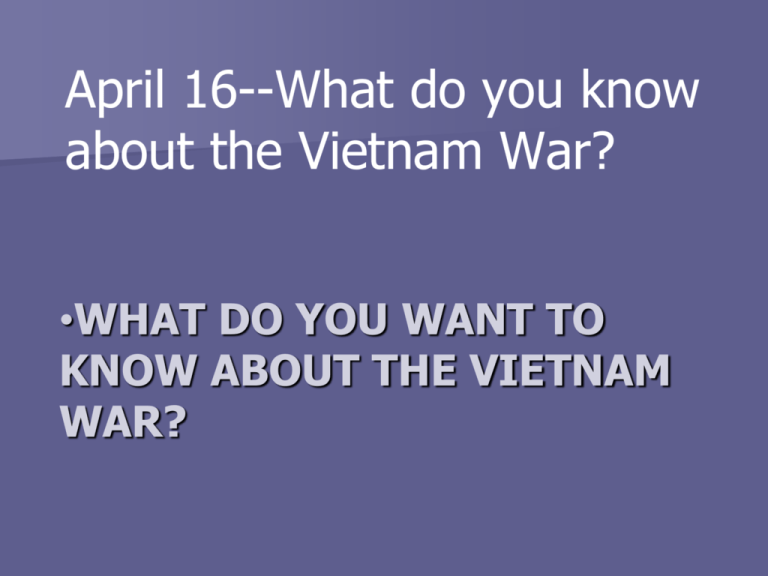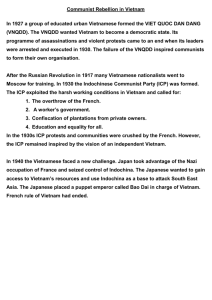The Vietnam War
advertisement

April 16--What do you know about the Vietnam War? •WHAT DO YOU WANT TO KNOW ABOUT THE VIETNAM WAR? The Vietnam War IB Objectives Spread of the Cold War from Europe US involvement in Vietnam US foreign policy during Cold War IB Sample Questions “The Vietnam War had a disastrous effect on the presidencies of both Lyndon B. Johnson and Richard Nixon.” To what extent do you agree with this statement? Compare and contrast the roles of Korea and Vietnam in the Cold War. Key Terms Ho Chi Minh Geneva Accords Ngo Dinh Diem Vietcong Lecture Outline I. II. III. IV. Why the US became involved The War Why the US lost Impact of the War Why the US got involved US foreign policy The Communist victory in Vietnam allowed the Soviet Navy to establish a strong presence in the South China Sea and to pose a military threat to the US in the region. Access to raw materials and markets of Indochina If a political party wanted to be successful in the next election it must have appeared firm against any Communist move. Causes of the War Indochina (Cambodia, Vietnam, and Laos) had been a French colony since the 1890s. Ho Chi Minh was a French educated Communist, who organized the Indochinese Communist Party (the Vietminh) in 1930. The Vietnamese, with US aid, raised a guerilla force of 5,000 men to fight the Japanese. The War of Independence In August 1945 the Vietminh proclaimed the independence of Vietnam. In November 1946 the Vietnamese War for Independence began. At first the US was unsympathetic towards the French but after the policy of containment was adopted the US began to support the French. Why did the US support France? The need to have French support in Europe against the Soviets The possibility of a Communist victory in Indochina The 1949 Communist victory in China The Korean War The War for Independence By the end of the war the US had given the French more than $2.6 billion in military aid. The Geneva Accords set the terms of the French withdrawal. Vietnam was temporarily divided at the 17th parallel. Elections were to be held in the summer of 1956. th 17 Parallel South Vietnam The French appointed Ngo Dinh Diem as the interim Premier of the South. With US support, Diem blocked the elections called for by the Geneva Accords and broke off all contact with the North. Between 1955 and 1961, the US gave South Vietnam more than $1 billion in economic and military assistance and by 1961 it was the 5th largest recipient of US foreign aid. April 19– Write an identification for the Geneva Accords. South Vietnam By the late 1950s the American mission in Saigon was the largest anywhere in the world with 1,500 men. By 1956 over 200,000 political opponents had been arrested. Diem refused to institute land reform or make other necessary economic and social changes. South Vietnam Diem’s refusal to hold the reunification elections and his harassment of Communists caused the Southern Communists, the Vietcong, to begin guerrilla warfare against the government. Ho formally approved the guerrilla campaign and began to send arms and advisers south to assist the Vietcong. North Vietnam Responds In 1958 about 700 government officials were assassinated, in 1960, 2,500. US military assistance more than doubled between 1961 and 1962 and the number of US military advisors increased from 3,205 to more than 9,000. South Vietnam May 1963 the Buddhists begin to protest Diem’s policies. In August Vietnamese forces carried out raids on Buddhist temples and arrested 1,400 people. On November 1, 1963 Diem and his brother were overthrown and murdered. 3 weeks later President Kennedy was assassinated. US Involvement Activity Recorder Presenters (2) UN p. 960-967 Henry Kissinger Vietnamization Pentagon papers “Christmas bombing” Paris accords SALT I Nixon Doctrine



![vietnam[1].](http://s2.studylib.net/store/data/005329784_1-42b2e9fc4f7c73463c31fd4de82c4fa3-300x300.png)




